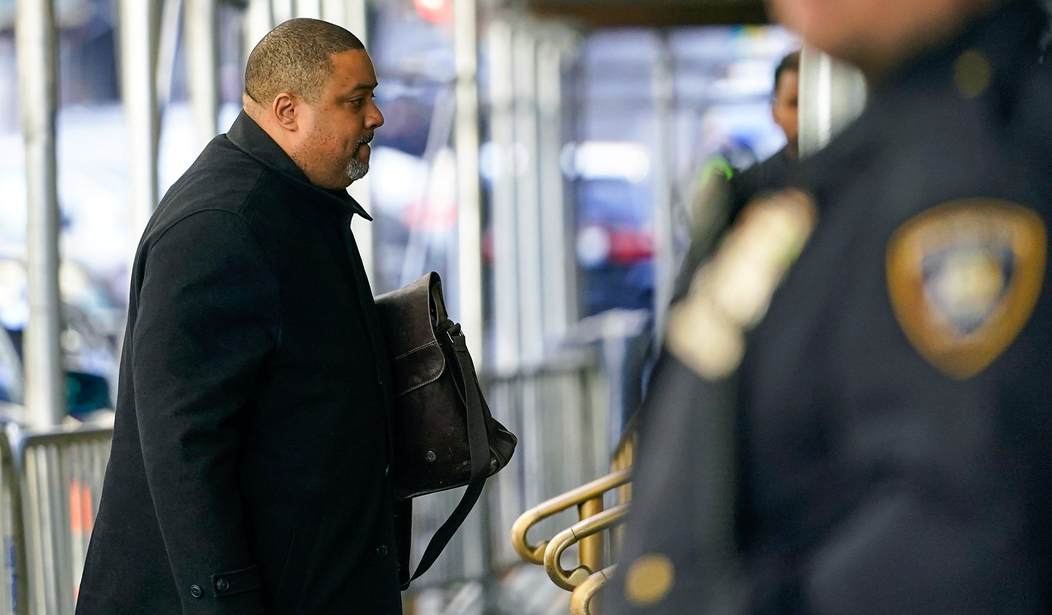As Ed noted earlier, the case against Trump involving the Stormy Daniels payoff suddenly seems to have gone from the front burner to the back burner and from there maybe off the back of the stove entirely. In an update, Ed notes that Politico says the grand jury may not touch the case again for a month.
This has led to plenty of speculation that the case itself is falling apart. Today the Daily Beast has a story reporting that even attorneys who worked on the case feel it’s weak.
The indictment that Manhattan District Attorney Alvin Bragg is currently seeking against former President Donald Trump—over his payment to silence a porn star about their sexual affair—is based on a crime that was so flimsy it was never viewed as a standalone criminal case, according to three attorneys who have worked on that investigation.
The current case is just part of a larger case which former DA Cy Vance Jr. considered several times at length and ultimately decided not to bring.
Vance twice commissioned outside lawyers—a rare step that’s nearly unheard of for such a law enforcement office—to research the matter. Vance decided against any criminal charges in late 2019 and revisited the decision in early 2021, but he ultimately decided against it.
The final nail in the coffin, though, seemed to come when Bragg inherited the case at the start of 2022. In his book, Pomerantz recalls a Feb. 9, 2022, meeting during which Bragg said he “could not see a world” in which he would use Cohen as a witness to indict Trump. On Tuesday, a spokeswoman for the office said that four people who were present at the meeting disputed that recollection.
The story goes on to say “Bragg has apparently come around on Cohen” and is making him the center of the case. That may be so but New York Magazine published a story yesterday arguing that Michael Cohen has a lot of obvious problems as a central witness, starting with his “pathological need for media attention.” The author cites a recent interview Cohen did on CNN with Don Lemon as just one example.
At one point in the discussion, Cohen touched on his criminal convictions but suggested that he had in fact been unfairly prosecuted. “One of the things that I think will come out of this investigation,” Cohen told Lemon, “other than the potential indictment of Donald Trump, is a lot of information about how the Southern District of New York dealt with me in my specific case.”…
Either he committed the offenses at issue and has accepted responsibility for them, a fundamental prerequisite for a crucial cooperating witness, or he was unfairly railroaded and forced to plead guilty despite being innocent of some or all charges. He cannot have it both ways, and there is no way that Trump’s lawyers, in a trial setting, will let this slide.
In other words, a central witness who argues that his own convictions were the result of malicious prosecution isn’t going to work well against a former president who is also arguing he’s a victim of malicious prosecution. The author then offers another example of Cohen’s slippery behavior from a recent media hit on MSNBC.
In another appearance on Ari Melber’s MSNBC show, Cohen offered Trump’s lawyers more future ammunition. At one point in the discussion, Melber played a clip of Trump lawyer Joe Tacopina attempting to discredit Cohen at length by referring offhand to Cohen’s misconduct “with the medallions and all that stuff.” Cohen began his response to Melber by saying, “Shame on Joe Tacopina. First and foremost, there was no fraud in the medallions. I don’t know even what he’s talking about.”
Here is a good guess: Tacopina was probably referring to the fact that Cohen pleaded guilty to tax evasion in connection with millions of dollars in revenue that he received through taxi medallions he had acquired.
Again, Cohen seems unwilling to admit responsibility even for things for which he was convicted. If he’s disputing his own convictions on television, he doesn’t make a very credible witness about anyone else’s guilt.
All of this suggests that Alvin Bragg may have gotten out over his skis with plans for an imminent indictment. Maybe that’s why the case is suddenly moving in slow motion.
Finally, it seems to me that the very best possible outcome for Trump is not that Bragg takes a second look and backs down from a weak case. The best outcome for Trump is that Bragg goes forward with a weak case and Trump walks out of the courtroom months from now as someone who was unfairly targeted. That’s something that will resonate with his voters. I don’t think Bragg’s goal is to supercharge Trump’s campaign but if it were his goal, this is exactly how he could accomplish it.








Join the conversation as a VIP Member